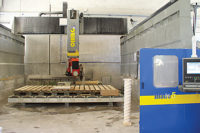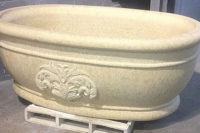Giving us an in-depth look at the sector, our hosts not only took us to observe the latest tile introductions at the exhibition, but they also arranged for us to see several of the leading Spanish tile factories. One of the main highlights of the trip for me was the opportunity to visit Decorativa's operation.
I always thought of Decorativa as a producer of high-end products, but what I witnessed in their factory was truly amazing. The company was established more than 100 years ago, and it specializes in traditional tile making.
To start, it was very generous of them to allow a press group such as ours into their facility to watch the process -- and photograph and shoot videos of it. And the level of dedication to high quality and attention to detail is truly incredible.
In an era where technology is at an all-time high, it is wonderful to see that Decorativa still values the craftsmanship of a true artisan. Our guide compared the process to baking in a kitchen -- and the similarities were evident.
One of the first steps we watched was a worker taking some clay and then pressing a tile mold into it and smoothing the top out -- very reminiscent to shaping cookies with a cookie cutter. It also is an illustration of a worker's true dedication, because that also takes a lot of arm strength!
Throughout the guided tour, we saw a range of craftsmanship at work -- from hand painting tiles to the glazing process to quality control. Our guide also explained that they have three different "baking" processes. Unlike high-production commercial operations that fire their tiles quickly at high temperatures, Decorativa will "bake" them for as long as several days at a low temperature -- just like slow roasting in an oven.
I am certainly not saying that the technical advances made in the tile manufacturing aren't tremendous. They allow for the fine textures and authentic replications of the look of natural materials such as stone and wood. I just thought it was important to share that there are still some artisan companies out there that truly are proud of honing the craft.







